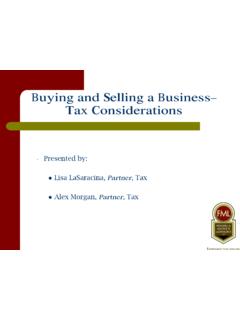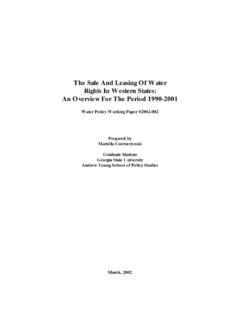Transcription of FUEL OILS TO CHINA - Essex Energy Marketing
1 fuel oils TO CHINA . Potential buyers often approach Essex Energy seeking M100/99 fuel oil (Mazut) for Chinese buyers . While fuel oils of almost any type are available from our refinery providers, the nature of this marketplace creates difficulty for potential buyers and resellers, as well as the Title Holder / Sellers themselves. The Failure-to-Close ratio for transactions proposed for fuel oil to CHINA is very high, and there is the added issue of a high default rate when payment for the product itself is requested. As a result, most Title Holder / Sellers now will not work with a mainland Chinese state-owned company using a Chinese bank; but will expect the Buyer to be a Western Company (domiciled in Korea, Japan, Hong Kong, Singapore, or the like), and using a top 50 Western Bank.
2 That Buyer can then deal with the forward sale to their mainland Chinese off-take buyers . This level of difficulty has also led to changes in the way Sellers will operate with Asian and other buyers . No one will deliver products and expect to be paid After Delivery on a CIQ ( CHINA Inspection & Quarantine Authority). basis. All products are paid for On Loading after the Buyer receives the appropriate Q&Q / SGS / POP documents, and is then in Full Title for the products. fuel OIL THE PRODUCT. fuel oil is a fraction obtained from petroleum distillation, either as a distillate or a residue. In general, fuel oil is any liquid petroleum product that is burned in a furnace or boiler for the generation of heat or used in an engine for the generation of power, except oils having a flash point of above approximately 40 C (104 F) and oils burned in cotton or wool-wick burners.
3 fuel oil is made of long hydrocarbon chains, particularly alkanes, cycloalkanes and aromatics. Under this broad definition diesel is a type of fuel oil, however the term fuel oil is more often used in a stricter sense to refer only to the heaviest commercial fuel that can be obtained from crude oil. Mazut-100 (often referred to as M-100 ) is a fuel oil that is manufactured to GOST specifications, for example GOST 10585-99 (GOST is the Russian system of standards, much like ASTM). Mazut is almost exclusively manufactured in the Russian Federation, Kazakhstan, Azerbaijan, and Turkmenistan. Russia, the largest producer, refines some around 90 million metric tons a year of M-100 fuel oil, with 80% being available for export.
4 According to figures given by the Russian Customs, in the last couple of years this country exported around 30,000,000MT each year. Page 1 of 4. CURRENT MARKET FOR fuel OIL IN CHINA . CHINA is a major consumer of fuel oil. The current total requirement is estimated at more than 350 million metric tons per year. Only 35% of this can be met by Chinese domestic production. fuel oil has three main customer bases in CHINA (in decreasing order of magnitude): INDUSTRIAL FEEDSTOCK. POWER / HEAT GENERATION. BUNKER fuel . Industrial Feedstock There are 68 refineries beyond the direct control of PetroChina and SINOPEC, which collectively require some 60-70 million metric tons per year of fuel oil.
5 Of these, 27 refineries are concentrated in Shandong Province and its surrounding areas. Refineries can crack' the fuel oil to produce diesel or it can be used as an additive in the general refining process. Power / Heat Generation The main concentration of power plants is in South CHINA around Guangdong Province. In addition, it is in this region where the numerous ceramic factories, focused around Foshan in Guangdong Province, have a huge requirement for fuel oil to run their kilns. Over the last decade these power plants and factories have invested heavily in equipment that is designed to burn fuel oil and, despite the serious environmental considerations, there is no prospect of any conversion to greener' fuels in the short to medium term.
6 fuel oil also solves the problem of achieving the very high temperatures essential for mass production in ceramics. This section of fuel oil consumers is not expected to grow significantly, but it will remain stable and a reliable customer base. Bunker fuel CHINA 's sea freight and sea fishing industries are both highly developed and centered in Northeastern, Eastern and Southern coastal regions. Vast fleets of cargo and fishing vessels of all sizes create a huge demand for fuel oil as a bunker fuel . This market segment looks set to expand further. The Eight largest sectors of CHINA 's domestic fuel oil market are currently: 1. More than 50 refineries in North CHINA , mainly in Shandong Province, with an annual demand of 45,000,000 MT, mainly for re-refining diesel and wax oil.
7 2. The three northeast provinces for fuelling cargo vessels;. 3. East CHINA , South CHINA coastal areas (including Fujian, Zhejiang, Jiangxi and Jiangsu Provinces) for fueling fishing fleets;. 4. The Central region of CHINA , around Hebei and Henan Provinces, for agricultural machinery;. 5. Shaanxi, Gansu and Ningxia Provinces for agricultural machinery;. 6. South CHINA , mainly Guangdong Province, for power generation;. 7. Southwest CHINA including South of Gansu Province, Guizhou and Sichuan Provinces for power generation;. 8. Guangdong Province for the ceramics industry. Projections for the increase in the average demand for fuel oil over the next 20 years are between 5 and 10%.
8 Annually. Page 2 of 4. MARKET PLAYERS AND DYNAMICS INSIDE CHINA . Since 2001, the Chinese authorities have licensed hundreds of companies to trade fuel oil inside CHINA . At present there are some 960 state and private companies licensed for such activity, many are end-users. Far fewer are allowed to import fuel oil, currently some 200. However, during the 2011 annual inspection round only 74 Chinese companies met all the criteria to be able to apply for permission to import fuel oil (which is granted selectively). In 2010, only 30 Chinese companies actually imported fuel oil. For the vast majority of Chinese companies (those that lack connections and favor) the importation process is fraught with difficulties.
9 Many fail to even start because they cannot get permission / facilities from their banks to issue BCL's or evidence of financial capability. A license effectively indicates that a company has legal rights to import, but permission to import' is also required, which brings in a multitude of obstacles and bureaucratic hurdles, especially related to banking outside CHINA . Internationally The international supply chain for fuel oil into CHINA (except Government-to-Government business) is fragmented. Russia and the former Soviet Union states are the main suppliers of fuel oil (Mazut M100) that is of the technical specification preferred by Chinese end-users. Most of the licensed Chinese importers lack international contacts and experience.
10 Consequently, they are driven into the hands of brokers and intermediaries who they appoint to source product and liaise with suppliers to negotiate terms and smooth procedural issues. The scale of the trades and the levels of profit and commission obtainable have attracted a myriad of (often dubious) broker companies and individuals to the business. The situation has been seriously worsened by the convenience and virtual' credibility offered by use of the internet, and further exacerbated by the ease of digital manipulation of documentation. A consequence of so many brokers and intermediaries acting, or purporting to act, on behalf of buyers in CHINA , compounded by the barriers to gaining permission to import and even bona-fide buyers often being handicapped by CHINA 's rigid and controlled banking sector, is that Russia and others suppliers of fuel oil are highly skeptical of anything related to CHINA .




